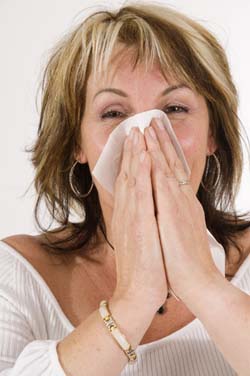
Does your body need an immune system boost?
Does it seem that every winter you get sick more often and it takes you much longer to get well? Does a common cold sideline you as long as the flu?
If this sounds familiar you could be suffering from a weak immune system. Weakened immunity makes us feel constantly tired, workouts are less effective and you constantly feel stressed out.
There are many reasons your immune system has taken a beating. It can be simple aging or environmental pollutants, pushing yourself too hard or chronic stress.
In fact just about everything can contribute to a weak immune system, but for most it isn’t a permanent problem. With these 5 tips, you can boost your immune system so you feel better and more energetic.
1. Live Well & Prosper
Ok so this is a pretty obvious one, but it is also one we are all most likely to forget or neglect. The best way to fight disease and illness is to maintain a healthy lifestyle, which includes:
- Don’t smoke or quit smoking
- Enjoy a diet high in fruits, vegetables and whole grains, and low in dairy and saturated fats.
- Exercise regularly; at least 3 days each week
- Rest often.
- Maintain a healthy weight.
- Regulate your blood pressure.
- If you drink alcohol, drink in moderation.
- Wash your hands regularly and cook meats using at least minimum internal temperatures.
- Get appropriate screening tests.
2. Several Vitamins A Day
A healthy diet is without a doubt important, but many of us don’t get all the vitamins and nutrients we need through our meals. Numerous studies have found deficiencies in micronutrients that can result in a reduction of immunity cells. Add more of these vitamins into your daily regimen:
- Selenium. Studies have found low selenium levels raise the risk of certain types of cancer, including; breast, bladder, colon, rectum, lung, and prostate.
- Vitamin A. Immunity experts agree that a vitamin A deficiency is linked to impaired immunity and an increased risk of infection.
- Vitamin B2. Studies have suggested that vitamin B2 boosts resistance to bacterial infections.
- Vitamin B6. A vitamin B6 deficiency can depress the formation of immunity cells.
- Vitamin C. Vitamin C works with other micronutrients to boost immunity.
- Vitamin D. Vitamin D, which most North Americans are deficient in, plays a role in many immune responses.
- Vitamin E. A study involving healthy subjects over age 65 found that high daily doses of vitamin E increased antibody responses to hepatitis B and tetanus after vaccination.
- Zinc. Zinc is essential for immunity cells. A deficiency affects the ability of these cells to function as they should.
3. Helping Herbs
The science on the usefulness of herbs as supplements is not quite complete. Many of the studies in existence provide anecdotal evidence or insufficient control groups. This is an important fact to remember with the large number of herbs on the market promising to boost immunity with no real proof.
While this is true it is also important to remember that Eastern culture has relied on herbal remedies for centuries with many positive results. Be careful in the supplements you choose, but here is a small list of herbs that can help boost your immunity:
- Aloe Vera. Topical aloe Vera is a powerful anti-inflammatory used to ward off infections from burns and other wounds.
- Astragals membranes. Derived from the root of the astragals plant, this herb stimulates the immune system, giving it greater fighting power.
- Garlic. Lab tests have proven garlic as a powerful foe against viruses, bacteria, and fungi. A 2006 study found a link between the frequency of use of garlic and a reduced risk of some common forms cancers in southern Europe.
- Ginseng. It’s unclear how ginseng root works, but non-Western practitioners have been prescribing ginseng to stimulate immune function for centuries.
4. Bacteria Is Your…Friend?
There is growing body of literature that indicates that a relationship exists between your immune system and the good bacteria found in your body. Scientists now know that certain bacteria can correct imbalances in order to increase the quantity of immunity cells.
Some anecdotal studies and incomplete studies have indicated that adding good bacteria like probiotics to your diet can increase immunity cell levels.
Many food and dairy products list probiotics on their labels. Unfortunately none of these ingredients are regulated, so the claims cannot be verified.
5. De-stress For Success
For decades modern medicine has treated stress and emotional instability as nothing more than an aside, but recently scientists have begun to understand and acknowledge that a link does exist between physical and mental health. Emotional stress can lead to as well as aggravate many health problems and delay recovery.
Researchers believe that psychological stress impacts the immune system by disrupting communication between the systems in the body that work together. Stress hormones like cortisol have a negative effect on our ability to handle stress.
Any steps you can take to reduce the stress of daily life–yoga, music, meditation, exercise or reading–can help boost your immune system to keep you healthy.
Most Popular:
Is THIS Clogging Up Your
Immune System?
Download this FREE guide now to discover how your intestinal tract is the key to a strong and healthy immune system and how you can make sure yours is as healthy as possible.



August 29 2011
Thank you for the healthy digest you publish. Continue such help. More power and God bless.
Thanks Elmer…
Glad you find the articles and videos helpful.
Since my dermy prescribed Retin A, I haven’t had a cold, scratchy throat, flu…anything. He tells me lots of oncologists prescribe it for their patients. Any research showing connections btwn Retinue A & increased immune benefits?
M.J. Please understand that we are not experts on pharmacological research and I do not know the answer to that question, but I will suggest to anyone being prescribed any drug that you ask as many questions to your Dr and to the Pharmacist and ever do your own research before taking the drug so you are informed and understand the risks and benefits…
Steve